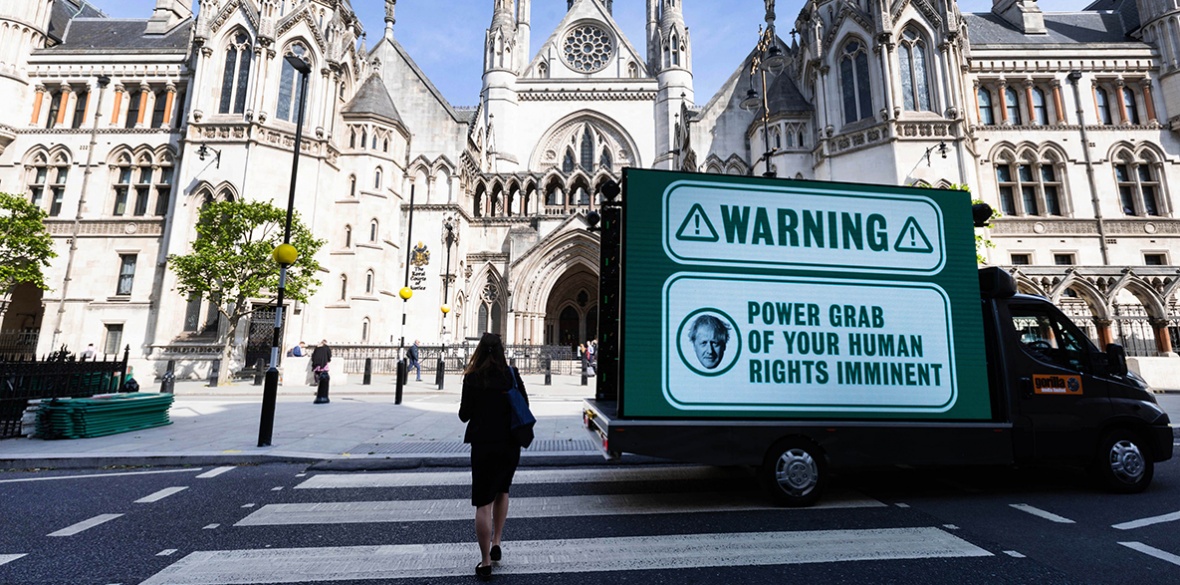A TORY government mired in sleaze, limping from scandal to scandal and headed by a prime minister who has visibly lost the confidence of swathes of his own MPs might be regarded as weak.
As the Bill of Rights debated in the Commons justice committee today indicates, this would be a serious mistake. The Boris Johnson government is engaged in a serious and so far largely successful attempt to roll back democratic rights.
In common with the Public Order Bill, the Police, Crime, Sentencing & Courts Act, spycops legislation and the Nationality & Borders Act, the Bill of Rights shows a determination to make executive state power unaccountable.
It will replace the Human Rights Act, and ministers are open enough about their desire to use it to stop legal challenges in cases such as deportations.
Its attempts to reduce British courts’ requirements to abide by European Court of Human Rights decisions does not make legal sense, since Britain is treaty-bound to adhere to the European Convention on Human Rights and ministers insist it will remain so.
But just as the Home Office had the gall to argue that its Rwanda deportations policy had the approval of the UN High Commission on Refugees when that body had said the exact opposite, ministers will pay lip service to the convention to pretend that Britain is meeting its treaty obligations while seeking to cut off our access to the rights it guarantees.
Ministers also claim the Bill will defend free speech. Yet it explicitly withdraws free speech protection in “criminal proceedings” or if there is “any question whether a provision of primary or subordinate legislation that creates a criminal offence” clashes with it.
The idea that a government set on deporting journalist Julian Assange to face 175 years in a US prison for exposing war crimes has any regard for free speech is laughable.
Its extremely curtailed “free speech” legislation leaves ministers free to rip up our right to free expression through a ban on the boycott, divestment and sanctions movement in solidarity with Palestine and imposing sanctions on universities or other bodies that allow Palestinian solidarity groups to hold meetings — which does not mean we should defend the “no-platforming” antics the government has seized on as an excuse for the new rules, which only divide and debilitate the left.
It comes alongside an Online Safety Bill likely to dramatically extend corporate censorship of the news, including by instructing social media platforms to remove “disinformation from foreign state actors.”
There is no shortage of such disinformation, but there is no shortage of disinformation from our own “state actors” and their tame media mouthpieces either.
As the US socialist Noam Chomsky points out, Russia’s invasion of Ukraine has prompted an extraordinary crackdown on any Western media questioning the US narrative about the war; our right to read and decide on the accuracy of different accounts is being shredded.
The result will not be less disinformation online but further control of online information by Western governments.
This splurge of authoritarian legislation takes place in a particular context.
First, an awareness that the public — whether by Brexit, or in the unexpected popularity of Labour’s socialist 2017 manifesto, or even in the current polls showing wide sympathy with strikes — is proving mutinous. Our rights to protest, organise, strike and exchange subversive ideas must be targeted in response.
Second, the new era of great power rivalry, dubbed by the US and British governments a struggle between Western democracy and authoritarian regimes. As in the past, a supposed battle against authoritarians abroad is used as an excuse for extremely authoritarian policies at home.
It is all about disarming a people who, if not insurgent, might become so. These issues cannot be separated from unions’ fight for higher wages and job security: the point of removing our rights is to make sure we lose that fight.












